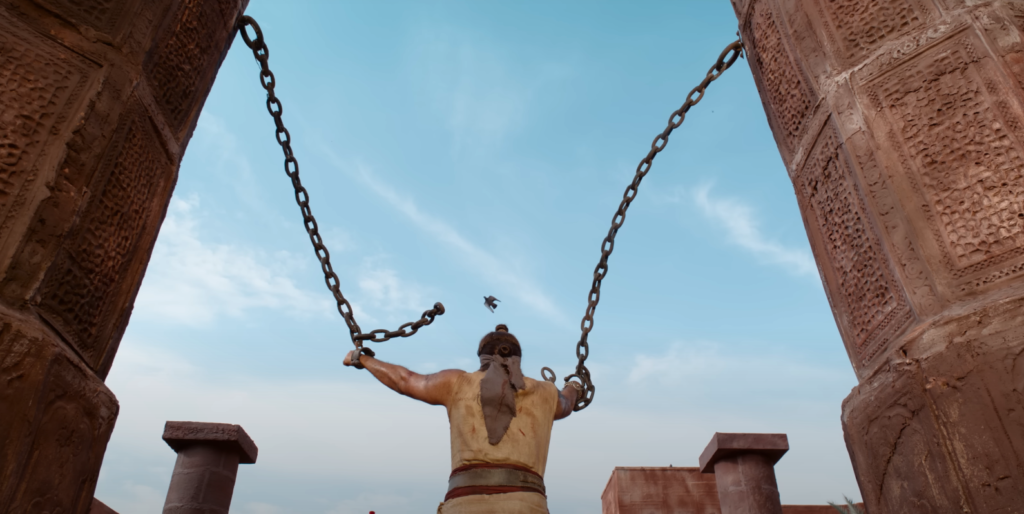Malayalam Movie Review: Malaikottai Vaaliban offers rousing action and visual references to push past wobbly drama, unsatisfying ending

Malaikottai Vaaliban begins with a strong evocation of the spaghetti Western, but its genre influences certainly do not stop there. (Somewhat peculiarly, it’s the second Indian film of the month to pay homage to the ’60s-born subgenre, following Captain Miller.) This is a movie steeped in visual references, made by a director (Lijo Jose Pellissery) whose love for international cinema overflows each frame. There are also several sequences that vividly recall both samurai and wuxia films, not just in terms of story content, but film language. Many recent Indian movies have felt like something Quentin Tarantino might have cooked up in terms of their stories, characters, and depictions of violence, but Malaikottai Vaaliban is the first that recalls Tarantino in the way that it fully leverages composition, color, and sound to create a subversive tribute to beloved films of the past.
The story itself is simple: a few hundred years ago, Malaikottai Vaaliban (played by Mohanlal, icon of Malayalam cinema) is a vagabond warrior who travels from one village to the next to challenge the strongest fighter they each have. Possessing both gravity-defying strength and delicate action finesse, he has never lost a match. Even though Vaaliban could easily use his might to reign over one of these towns for years to come, he chooses to simply celebrate each victory for an evening and beds a new woman before moving on, as though staying in motion is his sole moral obligation. His only two fellow travelers are his mentor and adoptive father Ayyanar (played by Hareesh Peradi) and Ayyanar’s son Chinnappayyan (played by Manoj Moses). Well, that is until Chinna finds a woman of his own, whom he can’t bear to abandon; suddenly the whimsical Jamanthipoovu (played by Katha Nandi) is along for the ride as well.
The film, light on dialogue and heavy on atmospherics and action set-pieces, is structured around each fight that Vaaliban volunteers for (or, more accurately, insists upon). Avoiding one of the major pitfalls of many fight-oriented movies, each battle is incredibly well-differentiated from the rest, both in terms of the powerful Vaaliban’s fighting style and the aesthetic choices that director Pellissery makes. The opening match feels like an exaggerated form of wrestling, while the second fight takes on the qualities of a martial arts epic (major Crouching Tiger, Hidden Dragon vibes). The third, and unquestionably the largest, of the action set-pieces sees Vaaliban take on the full might of the occupying Portuguese Army. It’s bloody, rousing, darkly funny (especially in its treatment of the King and Queen), and makes good use of firepower, which is otherwise sparingly incorporated into the film’s violence. Each action sequence feels fully realized and can stand on its own, in the same way as those in the Kill Bill films can.
While narrative largely takes a backseat throughout, there is always some melodrama festering in the background to grease the engine. Much of this involves the character of Chamathakan (played by a deliriously, deviously good Danish Sait), who early in the film gets into a fight with Vaaliban over the performer Rangapattinam Rangarani AKA Rani (played by Sonalee Kulkarni), the rare woman who makes Vaaliban regretful over his nomadic life. Chamathakan brings Vaaliban back to his village to challenge their strongest fighter, only for Vaaliban to squash him and remain undefeated. Jilted by these events, humiliatingly half-shaved, and banished from the village, Chamathakan spends the rest of the movie creeping in the shadows, working to pursue revenge against Vaaliban. As one might expect, even though Vaaliban appears to be far more formidable than Chamathakan, this rift has the potential for Shakespearean consequences, especially when Vaaliban reconnects with Rani.
Malaikottai Vaaliban works better as an action film than as a character drama, partly because director Pellissery, in the tradition of spaghetti Westerns and samurai pictures, allows for so much about the main characters to go unspoken. There is certainly a whole backstory to be gleaned in the silences, lurking behind each cast member’s eyes, but not one that is concretely developed. As such, most of the characters’ aspirations and conflicts must be kept exceedingly simple, which at times makes the film feel a bit like puppet theater when it’s not in full-action mode. This, I suspect, is the reason most genre films give their heroes a major focus or pursuit; it allows all of the emotions and motivations to be channeled into an accessible, single-minded premise. Malaikottai Vaaliban strays from this time-honored tradition, maintaining its hero as a floating vagabond, and it must drum up the drama through subplots as a result. But without really fleshing out these characters, said drama feels thin and at times arbitrary.
The film also errs when it comes to its ending. Following some genuinely effective, albeit abrupt surprises heading into the presumed climax, Pellissery opts for a hollow cliffhanger designed to tease a sequel to this movie. Not only does this render the film’s conclusion completely unsatisfying, it introduces a character who is marred by incredibly silly-looking VFX work. Had Malaikottai Vaaliban culminated in another exciting, epic fight between Vaaliban and his most formidable opponent yet, it could have finished on a truly rousing note. But instead, it cuts off before we get there, attempting to drum up excitement for a “Part II” without truly finishing the job on Part I. It’s just as frustrating a cliffhanger as Hanu Man featured earlier in the month.
But in spite of these flaws, I recommend Malaikottai Vaaliban overall. It’s a stunning visual feast, with some of the most impressively realized action sequences of late, and despite amalgamating dozens of aesthetic references, it looks like a truly singular piece of filmmaking. Not to mention, in the lead role, screen legend Mohanlal is commanding and impressively nuanced in his performance given the film’s relatively minimalist approach to dialogue. After a string of misfires, many in the Indian press have dubbed this a comeback vehicle of sorts for Mohanlal, one which really showcases his acting abilities instead of simply riding the wave of his mega-stardom, and I have to agree. Additional praise must also go to Prashant Pillai, who did the music; the score is just as diversely referential as the film’s aesthetic, and it’s a total sonic blast. The songs are also quite stirring, even as the film only includes one standout song-and-dance number (“Raaakk”). Malaikottai Vaaliban is far from a perfect movie, but with high-points like these, it’s impossible to dismiss.

